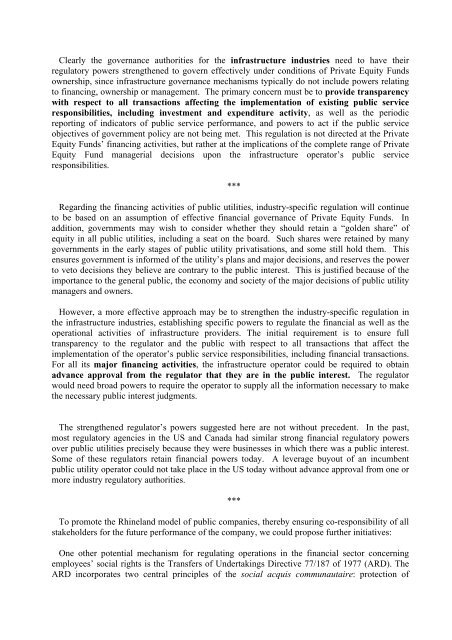Executive summary - Udo Bullmann
Executive summary - Udo Bullmann
Executive summary - Udo Bullmann
- No tags were found...
Create successful ePaper yourself
Turn your PDF publications into a flip-book with our unique Google optimized e-Paper software.
Clearly the governance authorities for the infrastructure industries need to have theirregulatory powers strengthened to govern effectively under conditions of Private Equity Fundsownership, since infrastructure governance mechanisms typically do not include powers relatingto financing, ownership or management. The primary concern must be to provide transparencywith respect to all transactions affecting the implementation of existing public serviceresponsibilities, including investment and expenditure activity, as well as the periodicreporting of indicators of public service performance, and powers to act if the public serviceobjectives of government policy are not being met. This regulation is not directed at the PrivateEquity Funds’ financing activities, but rather at the implications of the complete range of PrivateEquity Fund managerial decisions upon the infrastructure operator’s public serviceresponsibilities.***Regarding the financing activities of public utilities, industry-specific regulation will continueto be based on an assumption of effective financial governance of Private Equity Funds. Inaddition, governments may wish to consider whether they should retain a “golden share” ofequity in all public utilities, including a seat on the board. Such shares were retained by manygovernments in the early stages of public utility privatisations, and some still hold them. Thisensures government is informed of the utility’s plans and major decisions, and reserves the powerto veto decisions they believe are contrary to the public interest. This is justified because of theimportance to the general public, the economy and society of the major decisions of public utilitymanagers and owners.However, a more effective approach may be to strengthen the industry-specific regulation inthe infrastructure industries, establishing specific powers to regulate the financial as well as theoperational activities of infrastructure providers. The initial requirement is to ensure fulltransparency to the regulator and the public with respect to all transactions that affect theimplementation of the operator’s public service responsibilities, including financial transactions.For all its major financing activities, the infrastructure operator could be required to obtainadvance approval from the regulator that they are in the public interest. The regulatorwould need broad powers to require the operator to supply all the information necessary to makethe necessary public interest judgments.The strengthened regulator’s powers suggested here are not without precedent. In the past,most regulatory agencies in the US and Canada had similar strong financial regulatory powersover public utilities precisely because they were businesses in which there was a public interest.Some of these regulators retain financial powers today. A leverage buyout of an incumbentpublic utility operator could not take place in the US today without advance approval from one ormore industry regulatory authorities.***To promote the Rhineland model of public companies, thereby ensuring co-responsibility of allstakeholders for the future performance of the company, we could propose further initiatives:One other potential mechanism for regulating operations in the financial sector concerningemployees’ social rights is the Transfers of Undertakings Directive 77/187 of 1977 (ARD). TheARD incorporates two central principles of the social acquis communautaire: protection of





